Amongst various insect-pests, shoot gall psylla, Apsylla cistellata Buckton (Psyllidae: Homoptera) is a devastating pest of mango causing formation of galls on the leaf axils which result in inhibition of inflorescence and most of the affected branches later dry up. According to an estimate, mango orchards in more than 4,000 ha area are badly affected with incidence of shoot gall psylla in Dehradun district of Uttarakhand. From last one decade, the incidence of shoot gall psylla has increased considerably in Dehradun. Earlier, monocrotophos, dimethoate and quilanphos insecticides recommended for the control of shoot gall psylla these insecticides are not giving any relief to the farmers from the last 6-7 years, may be due to continuous use of these insecticides and change in agro environmental conditions.
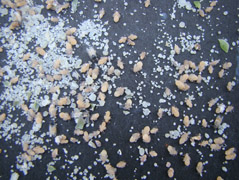
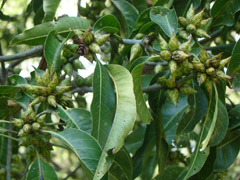
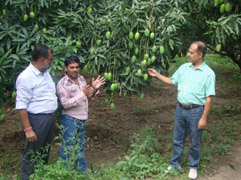
Krishi Vigyan Kendra, Dehradun approached ICAR-Central Institute of Sub Tropical Horticulture, Lucknow for effective management of shoot gall psylla in mango. The Institute suggested that thiamethoxam 1 g/liter of water + profenophos 2 ml/ liter of water + sticker 1 2 ml/ liter of water effectively manages of shoot gall psylla. Demonstrations conducted along with earlier recommended insecticides in which two spray of thiamethoxam 1 g/ liter of water + profenophos 2 ml/ liter of water have been reduced the incidence of shoot gall psylla up to 90 % in most affected orchard.
Technology
The insecticides i.e. thiamethoxam 1 g/ liter of water + profenophos 2 ml/ liter of water + sticker 1/ 2 ml/ liter of water have been found most promising in management of shoot gall psylla in mango. Two applications of both the insecticides were suggested, first spraying should be done in third week of August and second spraying be done 15 days after first spraying. The spraying of these insecticides by the farmers on the recommendation of KVK, Dehradun not only managed the incidence of shoot gall psylla but also doubled the productivity of mango.
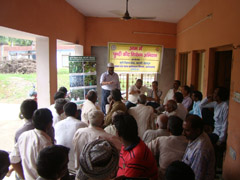
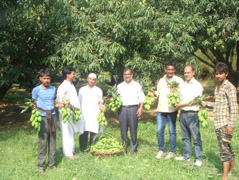
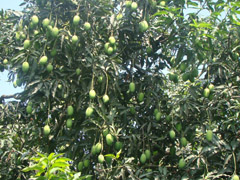
Impact of technology
Two Spraying of recommended insecticides were done by the farmers of Badwala village of Vikasnagar block of Dehradun in 21 ha area in August-September, 2013. Farmers harvested about 4000 Q. mango from 2100 trees in June-August, 2014.
Two spraying of recommended insecticides have been applied by the farmers of 24 villages of Vikasnagar and Sahaspur blocks of Dehradun in about 200 ha area. The spraying of these insecticides significantly reduced the incidence of shoot gall psylla and increased the productivity of mango. According to an estimate and data recorded, farmers harvested about 40,000 Q. mango from 200 ha area in June-August, 2015.
In the the last three years area has been increased from 21 ha in 2013 to 1,200 ha in 2015. According to an estimate and campaign organized in August, 2016 by KVK, Dehradun, it is expected that about more than 2,000 ha area will be covered under management of shoot gall psylla in 2016.
The productivity of mango increased from 9.6 MT/ ha to 20.0 /per ha. The visible impact reflected due to technological intervention on management of shoot gall psylla at Badwala village on 2,100 mango trees during August-September, 2013 completely changed the mindset of neighbouring farmers.
Effective management of shoot gall psylla in mango from 2013 to 2016 enhanced the income of farmers. Data recorded from the mango orchards and interaction held with the farmers revealed that about 6.0 crore additional income was earned by the farmers due to management of shoot gall psylla in mango from the last three years.
(Source: Krishi Vigyan Kendra, Dehradun)








Like on Facebook
Subscribe on Youtube
Follow on X X
Like on instagram